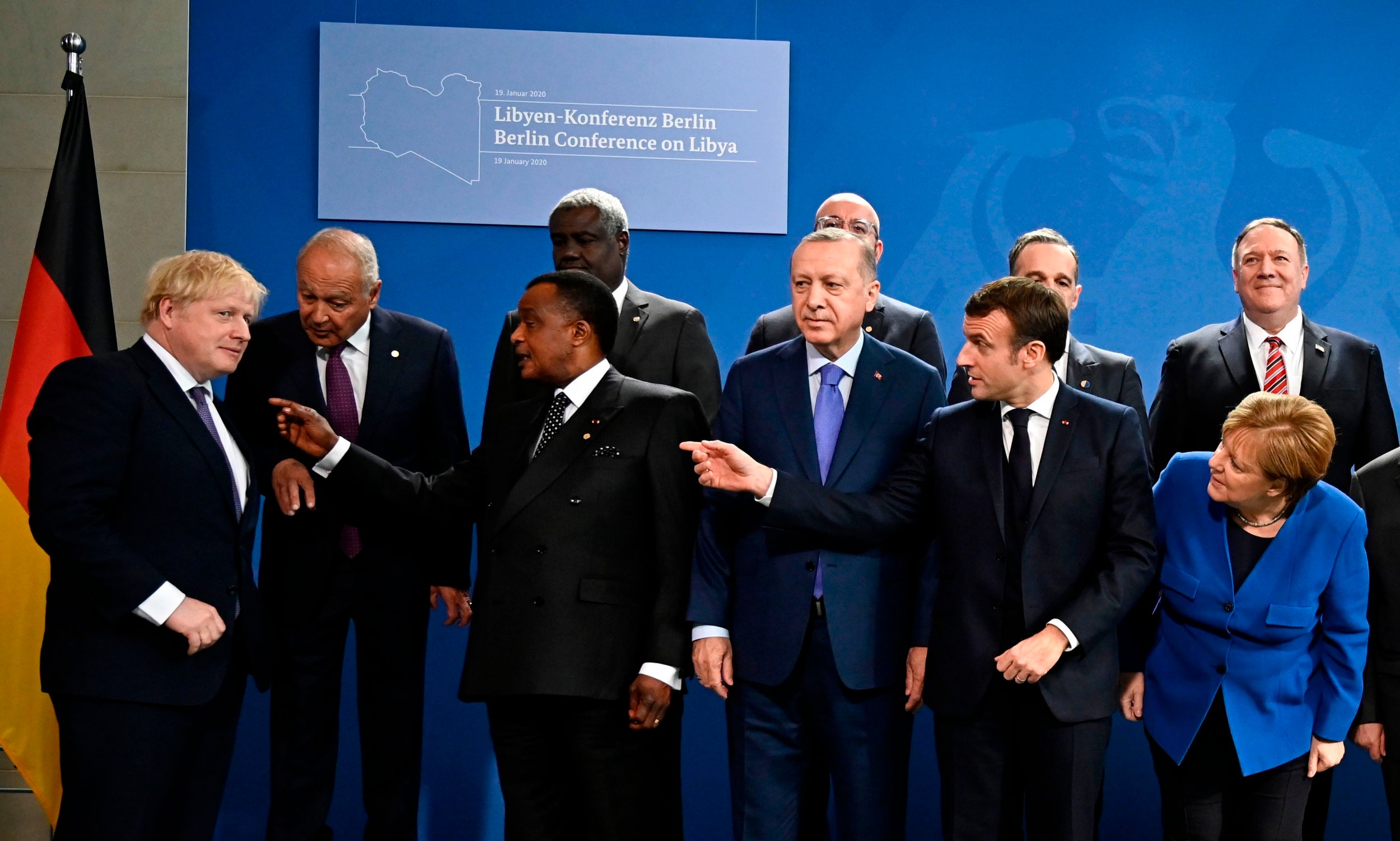A Brussels drive to create an EU-wide minimum wage system has run into opposition from trade unionists in some member states.
Portugal’s largest trade union federation, the CGTP, is the latest to speak out – arguing that the proposals are a “trap” and could hurt workers.
Trade unionists from Nordic countries such as Sweden and Denmark – where the setting of wages through collective bargaining is the norm – have also been critical of the plans, pushed by European Commission president Ursula von der Leyen.
Download the new Independent Premium app
Sharing the full story, not just the headlines
“The European Commission’s proposal clearly aims to assume a logic of interference in what is the responsibility of each member state, which is to define collective hiring policies and at the same time salary increases,” the Portuguese CGTP’s secretary-general, Arménio Carlos, argued.
“We are facing a trap because there is no European minimum salary. What there is is a discussion of criteria that, if applied, would be detrimental to Portuguese workers.”
Portugal has a relatively high minimum wage relative to its median income and poverty threshold and unions fear that EU criteria could be used as a pretext to set sights lower in future. It also has a high level of collective bargaining coverage, at 89 per cent.
Ms Von der Leyen says a framework governing EU minimum wages could help stop the “brain drain” from east to west across the continent and reduce the incentive for people to migrate between countries.
Under the plans, Brussels would not set an explicit salary floor but instead draw up rules as to what proportion of the cost of living the minimum wage would have to set in each country.
But some EU countries, including high-wage economies like Sweden, do not have statutory minimum wages – and instead tend to set wage floors through negotiations with trade unions and employer.
An EU promise that such rules would not force countries without a statutory minimum wage to introduce one appears not to have swayed the plans Scandinavian opponents.
Only the best news in your inbox
Lizette Risgaard, president of the Danish trade union confederation, said last week: “The wage-setting in the so-called Danish model of collective bargaining is based on negotiations between the social partners, and productivity and innovation are crucial elements in these negotiations.
“The precondition for the Danish model is great support from both workers and companies, and wage statistics show that the Danish model in general ensures that most workers in Denmark receive a wage that is both decent and can provide a good standard of living.
“A parallel system based on statutory minimum wage or universal coverage of collective agreements does not ensure that all workers receive a wage ensuring a decent standard of living. The Danish Confederation of Trade Unions therefore fears that a statutory minimum wage can weaken the effectiveness of the Danish model.”
Some elements of the UK trade union movement were opposed to statutory minimum wages before the Labour government introduced one in 1999. Such opposition is now rare to non-existent in Britain, however.
Six EU member states – Austria, Cyprus, Denmark, Finland, Italy and Sweden – set no statutory legal minimum wage and rely on trade unions to protect workers. The EU’s lowest absolute monthly minimum wage is Bulgaria’s €286, while the highest is Luxembourg’s €2,071.


1/50 23 January 2020
A Chinese police officer wears a protective mask as he stands guard next to an ad before the annual Spring Festival at a Beijing railway station. The number of cases of a deadly new coronavirus rose to over 500 in mainland China as health officials locked down the city of Wuhan in an effort to contain the spread of the pneumonia-like disease which medicals experts have been confirmed can be passed from human to human
Getty

2/50 22 January 2020
Visitors wear face masks as they sit inside the Venetian casino hotel resort in Macau, after the former Portuguese colony reported its first case of the new SARS-like virus that originated from Wuhan in China.
AFP via Getty

3/50 21 January 2020
Marine One helicopter with US President Donald Trump on board arrives for the 50th World Economic Forum (WEF) in Davos, Switzerland
Reuters

4/50 20 January 2020
A man walks between burning tires during ongoing anti-government protests in Najaf, Iraq
Reuters

5/50 19 January 2020
Britain’s Prime Minister Boris Johnson, Congolese President Denis Sassou Nguesso, Turkish President Recep Tayyip Erdogan, French President Emmanuel Macron, German Chancellor Angela Merkel, (second row, left to right) arab League Secretary General Ahmed Abul Gheit, African Union (AU) Committee Chairman Moussa Faki, European Council President Charles Michel, German Foreign Minister Heiko Maas, US Secretary of State Mike Pompeo pose for a family picture during a Peace summit on Libya at the Chancellery in Berlin
AFP via Getty

6/50 18 January 2020
Sweden’s Jennie-Lee Burmansson competing in the final run of the Freestyle Skiing Womens Freeski Slopestyle at the Leysin Park in Leysin, during the 2020 Lausanne Winter Youth Olympic Games
AFP via Getty

7/50 17 January 2020
Firefighters take part in a demonstration to protest against the attacks against them during interventions in Strasbourg. During the New Year’s Eve night in Strasbourg, two firefighters were notably injured following a projectile thrown onto the window of their truck. Last weekend, three firefighters were victims of a stabbing by a person they came to rescue in the outskirts of the city.
AFP via Getty

8/50 16 January 2020
People enjoy the frozen lake of Houhai in Beijing ahead of the Lunar New Year of the Rat. – The Lunar New Year falls on January 25 this year and marks the Year of the Rat.
AFP via Getty

9/50 15 January 2020
Taiwanese soldiers operate a CM-11 battle tank during an exercise at a military base in Kaohsiung, southern Taiwan
AFP via Getty

10/50 14 January 2020
A resident who briefly returned home to retrieve belongings carries figurines of Jesus Christ and Mother Mary in Laurel, Batangas province, Philippines. The Philippine Institute of Volcanology and Seismology raised the alert level to four out of five, warning that a hazardous eruption could take place anytime, as authorities have evacuated tens of thousands of people from the area
Getty

11/50 13 January 2020
Mini’s driver Jakub Przygonski and his co-driver Timo Gottschalk compete in Stage 8 of the Dakar 2020 around Wadi Ad-Dawasir
AFP via Getty

12/50 12 January 2020
People take photos of a phreatic explosion from the Taal volcano from the town of Tagaytay in Cavite province, southwest of Manila
AFP via Getty

13/50 11 January 2020
An injured Syrian child cries after being transported to a clinic for treatment following an air strike by pro-regime forces on the nothwestern city of Idlib
AFP via Getty

14/50 10 January 2020
Vets and volunteers treat koalas at Kangaroo Island Wildlife Park, southwest of Adelaide, Australia
AAP Image/Reuters

15/50 9 January 2020
Devotees follow the carriage transporting the statue of the Black Nazarene during an annual religious procession in its honour in Manila. Thousands of barefoot devotees joined the religious procession hoping to touch a centuries-old icon of Jesus Christ, called the Black Nazarene, which is believed to have miraculous powers
AFP via Getty

16/50 8 January 2020
People stand near the wreckage after a Ukrainian plane carrying 176 passengers crashed near Imam Khomeini airport in Tehran
ISNA/AFP via Getty

17/50 7 January 2020
Mourners gather around a vehicle carrying the coffin of Iranian top general Qasem Soleimani during the final stage of funeral processions, in his hometown Kerman. Soleimani was killed outside Baghdad airport Friday in a drone strike ordered by US President Donald Trump, ratcheting up tensions with Iran which has vowed “severe revenge”. The assassination of the 62-year-old heightened international concern about a new war in the Middle East and rattled financial markets
AFP via Getty

18/50 6 January 2020
Actor Rose McGowan speaks at a news conference outside a Manhattan courthouse after the arrival of Harvey Weinstein, in New York. Weinstein is on trial on charges of rape and sexual assault, more than two years after a torrent of women began accusing him of misconduct
AP

19/50 5 January 2020
Mourners march behind a vehicle carrying the coffins of slain major general Qassem Soleimani and others as they pay homage in the Iranian city of Mashhad
Tasnim News/AFP/Getty

20/50 4 January 2020
Rescue personnel search for bodies among mud and debris following a landslide caused by heavy rain in West Java, Indonesia
EPA

21/50 3 January 2020
A burning vehicle at the Baghdad International Airport is seen following an airstrike in Baghdad, Iraq. The Pentagon said Thursday that the US military has killed Gen. Qassem Soleimani, the head of Iran’s elite Quds Force, at the direction of President Donald Trump
AP

22/50 2 January 2020
Boats are pulled ashore as smoke and wildfires rage behind Lake Conjola, Australia. Thousands of tourists fled Australia’s wildfire-ravaged eastern coast ahead of worsening conditions as the military started to evacuate people trapped on the shore further south
Robert Oerlemans via AP

23/50 1 January 2020
Photographer Matt Roberts reacts to seeing his sister’s house destroyed by a bushfire in Quaama, New South Wales, Australia
EPA

24/50 31 December 2019
A man rides a donkey cart against the last setting sun of 2019 in Lahore, Pakistan
Reuters

25/50 30 December 2019
A Skycrane drops water on a bushfire in Bundoora, Melbourne, Australia. According to local media reports, thousands of residents and tourists were forced to evacuate in the state of Victoria as soaring temperatures and winds fanned several bushfires around the state
EPA

26/50 29 December 2019
A jumper soars through the air during a trial jump at the first stage of the 68th four hills ski jumping tournament in Oberstdorf, Germany
AP

27/50 28 December 2019
Revellers dressed in mock military garb throw eggs as they take part in the “Els Enfarinats” battle in the southeastern Spanish town of Ibi on December 28, 2019. – During this 200-year-old traditional festival participants known as Els Enfarinats (those covered in flour) dress in military clothes and stage a mock coup d’etat as they battle using flour, eggs and firecrackers outside the city town hall as part of the celebrations of the Day of the Innocents, a traditional day in Spain for pulling pranks.
AFP via Getty

28/50 27 December 2019
The Panamanian-flag cargo ship “Zelek Star” is pictured after being washed up on a beach in the southern Israeli coastal city of Ashdod during a storm
AFP via Getty

29/50 26 December 2019
Monks wearing solar filter glasses watch the “ring of fire” solar eclipse at the Gaden monastery in a Tibetan colony in Teginkoppa, India
AFP via Getty

30/50 25 December 2019
A participant in a Darth Vader costume jumps into the water during the 110th edition of the ‘Copa Nadal’ (Christmas Cup) swimming competition in Barcelona’s Port Vell. The traditional 200-meter Christmas swimming race included more than 300 participants on Barcelona’s old harbour
AFP/Getty

31/50 24 December 2019
Children dressed as Santa Claus during celebrations on Christmas Eve at a school in Amritsar
AFP via Getty

32/50 23 December 2019
Palestinians wearing Christmas costumes distribute gifts to children seated atop the rubble of a house demolished by Israel, reportedly for not being built with official licensing in the village of al-Khader, west of of Bethlehem in the occupied West Bank
AFP via Getty

33/50 22 December 2019
A journalist gets pepper-sprayed after a heated exchange with police during a rally in Hong Kong to show support for the Uighur minority in China. Hong Kong riot police broke up a solidarity rally for China’s Uighurs — with one officer drawing a pistol — as the city’s pro-democracy movement likened their plight to that of the oppressed Muslim minority
AFP via Getty

34/50 21 December 2019
Children react as a Bengal tiger licks the glass surrounding its enclosure during the “Animal Christmas Party”, where the youths were treated to a tour of the Malabon Zoo, in Manila
AFP via Getty

35/50 20 December 2019
In this long exposure photo, the United Launch Alliance Atlas V rocket carrying the Boeing Starliner crew capsule lifts off on an orbital flight test to the International Space Station from Cape Canaveral
AP

36/50 19 December 2019
A freediver wearing a Father Christmas outfit poses underwater off the coast of the northern city of Batroun
AFP via Getty

37/50 18 December 2019
People rally in support of the impeachment of US President Donald Trump in front of the US Capitol, as the House readies for the historic vote
AFP via Getty

38/50 17 December 2019
Protesters set fire to dumpsters and tires as they block a road in the southern Lebanese city of Sidon
AFP via Getty

39/50 16 December 2019
People ride a merry-go-round at the Christmas Market at the Red Square in Moscow
AFP via Getty

40/50 15 December 2019
The Red Rebels, part of the Extinction Rebellion Australia demonstrator group, participate in a climate protest rally in Sydney. The group rallied in front of the landmark Sydney Opera House demanding urgent climate action from Australia’s government, as bushfire smoke choking the city caused health problems to spike
AFP via Getty

41/50 14 December 2019
Protesters block a road after setting buses on fire during a demonstration against the Indian government’s Citizenship Amendment Bill in Howrah, on the outskirts of Kolkata, India. Protests against a divisive new citizenship law raged on as Washington and London issued travel warnings for northeast India following days of violent clashes that have killed two people so far
AFP via Getty

42/50 13 December 2019
A huge cloud of black smoke raises over a burning warehouse in the southern outskirts of Moscow. There were no immediate reports of any casualties, but one fire fighter was injured and 25 ambulance cars and a special air testing vehicle are at the site, they added
EPA

43/50 12 December 2019
A slow shutter speed shot shows oarsmen in traditional costume rowing during the Royal Barge Procession to mark the conclusion of the Royal Coronation ceremony, on the Chao Phraya River in Bangkok, Thailand. The ceremony honours King Rama X after his complete accession to the throne
EPA

44/50 11 December 2019
A boy inspects his damaged home after after an attack near the Bagram Air Base in Kabul, Afghanistan, A powerful suicide bombing targeted an under-construction medical facility near the main American base north of the capital
AP

45/50 10 December 2019
Swedish climate activist Greta Thunberg arrives to participate in the event “Unite behind the science” within the UN Climate Change Conference COP25 in Madrid
AFP via Getty

46/50 9 December 2019
White Island (Whakaari) volcano, as it erupts, in the Bay of Plenty, New Zealand. According to police, at least five people have died in the volcanic erruption
EPA/Michael Schade

47/50 8 December 2019
People gather amidst the ruins of a building, destroyed during reported Syrian regime and Russian air strikes the previous day in the town of Balyun. The reported air raids killed 19 civilians, eight of them children, in the country’s last major opposition bastion
AFP via Getty

48/50 7December 2019
A French CGT unionist holds up the union’s flag as he demonstrates against unemployment amidst smoke bombs in Nantes. The most serious nationwide strike to hit France in years caused new misery for weekend travellers, with defiant unions dismissing proposals by the government and warning walkouts would last well into next week
AFP via Getty

49/50 6 December 2019
People stand on top of a collapsed six-storey building in Nairobi, Kenya. Local media reported that several people are feared trapped as the rescue operation continues
EPA

50/50 5 December 2019
Indonesia players celebrate a point during their match against Vietnam in the women’s volleyball preliminary round of the Southeast Asian Games being held in the Philippines
Reuters

1/50 23 January 2020
A Chinese police officer wears a protective mask as he stands guard next to an ad before the annual Spring Festival at a Beijing railway station. The number of cases of a deadly new coronavirus rose to over 500 in mainland China as health officials locked down the city of Wuhan in an effort to contain the spread of the pneumonia-like disease which medicals experts have been confirmed can be passed from human to human
Getty

2/50 22 January 2020
Visitors wear face masks as they sit inside the Venetian casino hotel resort in Macau, after the former Portuguese colony reported its first case of the new SARS-like virus that originated from Wuhan in China.
AFP via Getty

3/50 21 January 2020
Marine One helicopter with US President Donald Trump on board arrives for the 50th World Economic Forum (WEF) in Davos, Switzerland
Reuters

4/50 20 January 2020
A man walks between burning tires during ongoing anti-government protests in Najaf, Iraq
Reuters

5/50 19 January 2020
Britain’s Prime Minister Boris Johnson, Congolese President Denis Sassou Nguesso, Turkish President Recep Tayyip Erdogan, French President Emmanuel Macron, German Chancellor Angela Merkel, (second row, left to right) arab League Secretary General Ahmed Abul Gheit, African Union (AU) Committee Chairman Moussa Faki, European Council President Charles Michel, German Foreign Minister Heiko Maas, US Secretary of State Mike Pompeo pose for a family picture during a Peace summit on Libya at the Chancellery in Berlin
AFP via Getty

6/50 18 January 2020
Sweden’s Jennie-Lee Burmansson competing in the final run of the Freestyle Skiing Womens Freeski Slopestyle at the Leysin Park in Leysin, during the 2020 Lausanne Winter Youth Olympic Games
AFP via Getty

7/50 17 January 2020
Firefighters take part in a demonstration to protest against the attacks against them during interventions in Strasbourg. During the New Year’s Eve night in Strasbourg, two firefighters were notably injured following a projectile thrown onto the window of their truck. Last weekend, three firefighters were victims of a stabbing by a person they came to rescue in the outskirts of the city.
AFP via Getty

8/50 16 January 2020
People enjoy the frozen lake of Houhai in Beijing ahead of the Lunar New Year of the Rat. – The Lunar New Year falls on January 25 this year and marks the Year of the Rat.
AFP via Getty

9/50 15 January 2020
Taiwanese soldiers operate a CM-11 battle tank during an exercise at a military base in Kaohsiung, southern Taiwan
AFP via Getty

10/50 14 January 2020
A resident who briefly returned home to retrieve belongings carries figurines of Jesus Christ and Mother Mary in Laurel, Batangas province, Philippines. The Philippine Institute of Volcanology and Seismology raised the alert level to four out of five, warning that a hazardous eruption could take place anytime, as authorities have evacuated tens of thousands of people from the area
Getty

11/50 13 January 2020
Mini’s driver Jakub Przygonski and his co-driver Timo Gottschalk compete in Stage 8 of the Dakar 2020 around Wadi Ad-Dawasir
AFP via Getty

12/50 12 January 2020
People take photos of a phreatic explosion from the Taal volcano from the town of Tagaytay in Cavite province, southwest of Manila
AFP via Getty

13/50 11 January 2020
An injured Syrian child cries after being transported to a clinic for treatment following an air strike by pro-regime forces on the nothwestern city of Idlib
AFP via Getty

14/50 10 January 2020
Vets and volunteers treat koalas at Kangaroo Island Wildlife Park, southwest of Adelaide, Australia
AAP Image/Reuters

15/50 9 January 2020
Devotees follow the carriage transporting the statue of the Black Nazarene during an annual religious procession in its honour in Manila. Thousands of barefoot devotees joined the religious procession hoping to touch a centuries-old icon of Jesus Christ, called the Black Nazarene, which is believed to have miraculous powers
AFP via Getty

16/50 8 January 2020
People stand near the wreckage after a Ukrainian plane carrying 176 passengers crashed near Imam Khomeini airport in Tehran
ISNA/AFP via Getty

17/50 7 January 2020
Mourners gather around a vehicle carrying the coffin of Iranian top general Qasem Soleimani during the final stage of funeral processions, in his hometown Kerman. Soleimani was killed outside Baghdad airport Friday in a drone strike ordered by US President Donald Trump, ratcheting up tensions with Iran which has vowed “severe revenge”. The assassination of the 62-year-old heightened international concern about a new war in the Middle East and rattled financial markets
AFP via Getty

18/50 6 January 2020
Actor Rose McGowan speaks at a news conference outside a Manhattan courthouse after the arrival of Harvey Weinstein, in New York. Weinstein is on trial on charges of rape and sexual assault, more than two years after a torrent of women began accusing him of misconduct
AP

19/50 5 January 2020
Mourners march behind a vehicle carrying the coffins of slain major general Qassem Soleimani and others as they pay homage in the Iranian city of Mashhad
Tasnim News/AFP/Getty

20/50 4 January 2020
Rescue personnel search for bodies among mud and debris following a landslide caused by heavy rain in West Java, Indonesia
EPA

21/50 3 January 2020
A burning vehicle at the Baghdad International Airport is seen following an airstrike in Baghdad, Iraq. The Pentagon said Thursday that the US military has killed Gen. Qassem Soleimani, the head of Iran’s elite Quds Force, at the direction of President Donald Trump
AP

22/50 2 January 2020
Boats are pulled ashore as smoke and wildfires rage behind Lake Conjola, Australia. Thousands of tourists fled Australia’s wildfire-ravaged eastern coast ahead of worsening conditions as the military started to evacuate people trapped on the shore further south
Robert Oerlemans via AP

23/50 1 January 2020
Photographer Matt Roberts reacts to seeing his sister’s house destroyed by a bushfire in Quaama, New South Wales, Australia
EPA

24/50 31 December 2019
A man rides a donkey cart against the last setting sun of 2019 in Lahore, Pakistan
Reuters

25/50 30 December 2019
A Skycrane drops water on a bushfire in Bundoora, Melbourne, Australia. According to local media reports, thousands of residents and tourists were forced to evacuate in the state of Victoria as soaring temperatures and winds fanned several bushfires around the state
EPA

26/50 29 December 2019
A jumper soars through the air during a trial jump at the first stage of the 68th four hills ski jumping tournament in Oberstdorf, Germany
AP

27/50 28 December 2019
Revellers dressed in mock military garb throw eggs as they take part in the “Els Enfarinats” battle in the southeastern Spanish town of Ibi on December 28, 2019. – During this 200-year-old traditional festival participants known as Els Enfarinats (those covered in flour) dress in military clothes and stage a mock coup d’etat as they battle using flour, eggs and firecrackers outside the city town hall as part of the celebrations of the Day of the Innocents, a traditional day in Spain for pulling pranks.
AFP via Getty

28/50 27 December 2019
The Panamanian-flag cargo ship “Zelek Star” is pictured after being washed up on a beach in the southern Israeli coastal city of Ashdod during a storm
AFP via Getty

29/50 26 December 2019
Monks wearing solar filter glasses watch the “ring of fire” solar eclipse at the Gaden monastery in a Tibetan colony in Teginkoppa, India
AFP via Getty

30/50 25 December 2019
A participant in a Darth Vader costume jumps into the water during the 110th edition of the ‘Copa Nadal’ (Christmas Cup) swimming competition in Barcelona’s Port Vell. The traditional 200-meter Christmas swimming race included more than 300 participants on Barcelona’s old harbour
AFP/Getty

31/50 24 December 2019
Children dressed as Santa Claus during celebrations on Christmas Eve at a school in Amritsar
AFP via Getty

32/50 23 December 2019
Palestinians wearing Christmas costumes distribute gifts to children seated atop the rubble of a house demolished by Israel, reportedly for not being built with official licensing in the village of al-Khader, west of of Bethlehem in the occupied West Bank
AFP via Getty

33/50 22 December 2019
A journalist gets pepper-sprayed after a heated exchange with police during a rally in Hong Kong to show support for the Uighur minority in China. Hong Kong riot police broke up a solidarity rally for China’s Uighurs — with one officer drawing a pistol — as the city’s pro-democracy movement likened their plight to that of the oppressed Muslim minority
AFP via Getty

34/50 21 December 2019
Children react as a Bengal tiger licks the glass surrounding its enclosure during the “Animal Christmas Party”, where the youths were treated to a tour of the Malabon Zoo, in Manila
AFP via Getty

35/50 20 December 2019
In this long exposure photo, the United Launch Alliance Atlas V rocket carrying the Boeing Starliner crew capsule lifts off on an orbital flight test to the International Space Station from Cape Canaveral
AP

36/50 19 December 2019
A freediver wearing a Father Christmas outfit poses underwater off the coast of the northern city of Batroun
AFP via Getty

37/50 18 December 2019
People rally in support of the impeachment of US President Donald Trump in front of the US Capitol, as the House readies for the historic vote
AFP via Getty

38/50 17 December 2019
Protesters set fire to dumpsters and tires as they block a road in the southern Lebanese city of Sidon
AFP via Getty

39/50 16 December 2019
People ride a merry-go-round at the Christmas Market at the Red Square in Moscow
AFP via Getty

40/50 15 December 2019
The Red Rebels, part of the Extinction Rebellion Australia demonstrator group, participate in a climate protest rally in Sydney. The group rallied in front of the landmark Sydney Opera House demanding urgent climate action from Australia’s government, as bushfire smoke choking the city caused health problems to spike
AFP via Getty

41/50 14 December 2019
Protesters block a road after setting buses on fire during a demonstration against the Indian government’s Citizenship Amendment Bill in Howrah, on the outskirts of Kolkata, India. Protests against a divisive new citizenship law raged on as Washington and London issued travel warnings for northeast India following days of violent clashes that have killed two people so far
AFP via Getty

42/50 13 December 2019
A huge cloud of black smoke raises over a burning warehouse in the southern outskirts of Moscow. There were no immediate reports of any casualties, but one fire fighter was injured and 25 ambulance cars and a special air testing vehicle are at the site, they added
EPA

43/50 12 December 2019
A slow shutter speed shot shows oarsmen in traditional costume rowing during the Royal Barge Procession to mark the conclusion of the Royal Coronation ceremony, on the Chao Phraya River in Bangkok, Thailand. The ceremony honours King Rama X after his complete accession to the throne
EPA

44/50 11 December 2019
A boy inspects his damaged home after after an attack near the Bagram Air Base in Kabul, Afghanistan, A powerful suicide bombing targeted an under-construction medical facility near the main American base north of the capital
AP

45/50 10 December 2019
Swedish climate activist Greta Thunberg arrives to participate in the event “Unite behind the science” within the UN Climate Change Conference COP25 in Madrid
AFP via Getty

46/50 9 December 2019
White Island (Whakaari) volcano, as it erupts, in the Bay of Plenty, New Zealand. According to police, at least five people have died in the volcanic erruption
EPA/Michael Schade

47/50 8 December 2019
People gather amidst the ruins of a building, destroyed during reported Syrian regime and Russian air strikes the previous day in the town of Balyun. The reported air raids killed 19 civilians, eight of them children, in the country’s last major opposition bastion
AFP via Getty

48/50 7December 2019
A French CGT unionist holds up the union’s flag as he demonstrates against unemployment amidst smoke bombs in Nantes. The most serious nationwide strike to hit France in years caused new misery for weekend travellers, with defiant unions dismissing proposals by the government and warning walkouts would last well into next week
AFP via Getty

49/50 6 December 2019
People stand on top of a collapsed six-storey building in Nairobi, Kenya. Local media reported that several people are feared trapped as the rescue operation continues
EPA

50/50 5 December 2019
Indonesia players celebrate a point during their match against Vietnam in the women’s volleyball preliminary round of the Southeast Asian Games being held in the Philippines
Reuters
A European Commission statement said: “There will not be a one-size-fits-all minimum wage. Any potential proposal will reflect national traditions, whether collective agreements or legal provisions. Some countries already have excellent systems in place. The Commission wishes to ensure all systems are adequate, have sufficient coverage, include thorough consultation of social partners, and have an appropriate update mechanism in place.”
Nicolas Schmit, Commissioner for Jobs and Social Rights, said: “The working lives of millions of Europeans will change in the coming years. We need to take action to allow the future workforce to flourish.
“Europe’s innovative and inclusive social market economy must be about people: providing them with quality jobs that pay an adequate wage. No Member State, no region, no person can be left behind. We must continue to strive for the highest of standards in labour markets, so that all Europeans can live their lives with dignity and ambition.”


